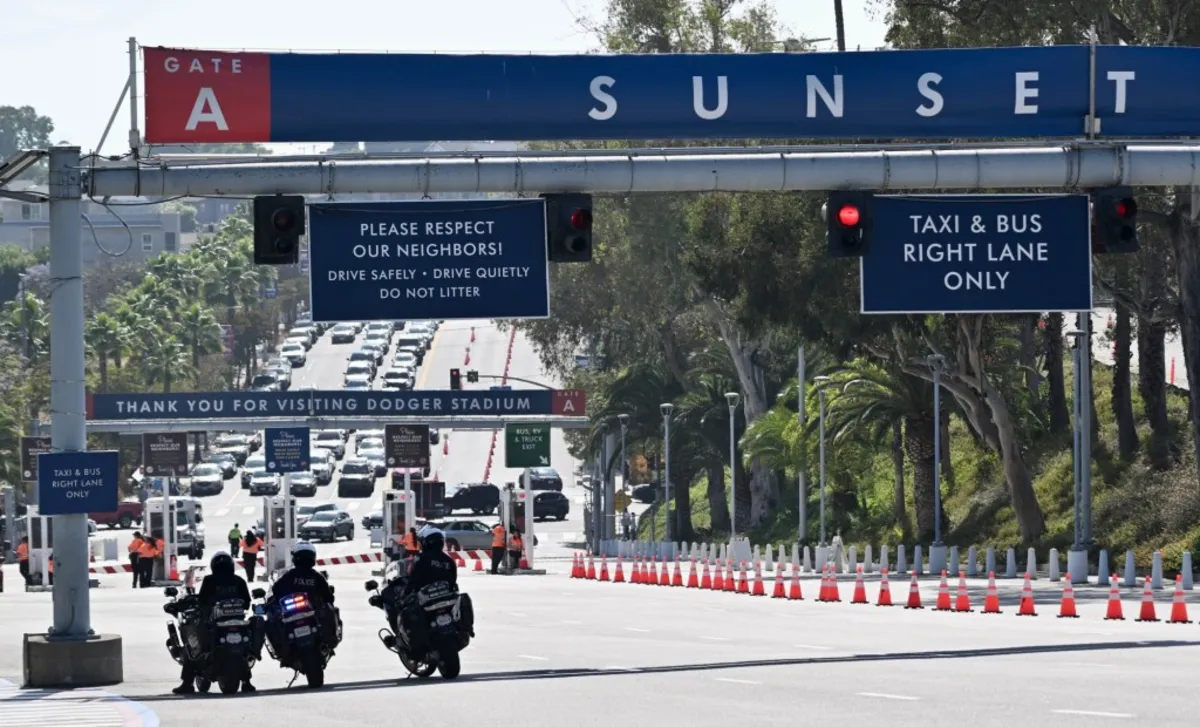
LOS ANGELES — The recent unrest triggered by ICE raids in the Los Angeles area has now reached Dodger Stadium. On Thursday morning, federal agents attempted to access the stadium but were denied entry. Video footage captured the moment as approximately 20 vehicles approached Gate A, only to be turned away by a security guard. This pattern was replicated at Gate E, leaving many uncertain about the affiliations of these agents, whether they were from Immigration and Customs Enforcement (ICE), Border Patrol, or a mix of both, both of which operate under the Department of Homeland Security.
In the hours following the attempted access, news cameras documented the agents' vehicles parked outside the stadium entrance until they were escorted away by Los Angeles police around noon, coinciding with the arrival of protesters. The Dodgers publicly acknowledged the incident, stating, “ICE agents came to Dodger Stadium and requested permission to access the parking lots. They were denied entry to the grounds by the organization. Tonight’s game will be played as scheduled.” In contrast, the official Homeland Security social media account denied any involvement in operations at Dodger Stadium, asserting that the presence of CBP vehicles was unrelated to enforcement actions.
Sources indicate that the operation was connected to the transfer of detainees between vehicles, further intensifying the concerns surrounding the federal agents' presence. The DHS tweeted, “This had nothing to do with the Dodgers,” clarifying that the brief presence of their vehicles was not linked to any ongoing operations or enforcement activities.
The Dodgers have faced criticism for their perceived silence during the civil unrest that has unfolded over the past two weeks, a period marked by aggressive ICE raids and the deployment of National Guard troops and Marines, which has taken place against the backdrop of opposition from California Governor Gavin Newsom and Los Angeles Mayor Karen Bass. In response to this criticism, the Dodgers announced plans to support immigrant communities through various programs and donations, although the timing of this announcement has been postponed due to the events of the day.
The events unfolded around 8 a.m. when federal agents first arrived at the stadium. As the morning progressed, protesters gathered at Gate E, confronting a line of police officers while holding signs that voiced their opposition to immigration enforcement, with messages like “ICE out of LA” and calls for family unity. The police warned the protesters that crossing the gate into the stadium could lead to arrests, leading to the eventual dispersal of the police line around 12:30 p.m.
Despite the denial of access to ICE agents, a small group of about two dozen individuals, some wearing Dodgers jerseys, remained at the gates. Councilmember Eunisses Hernandez arrived at the scene, revealing that she had been in communication with Dodgers officials and the mayor’s office regarding the situation. “We’re waiting to see that movement happen here,” she stated, highlighting the distinction between public and private property rights.
The Dodgers have a complex history with the Latino community in Los Angeles, dating back to the displacement of residents from Chavez Ravine for the construction of Dodger Stadium in the early 1960s. This historical context plays a crucial role in the current relationship between the team and its fan base, particularly as Latino fans now constitute a significant portion of their support. Iconic figures like Fernando Valenzuela have helped mend some of the past wounds, establishing a strong connection with the community.
Only one player, utilityman Kiké Hernandez, has publicly addressed the current situation. He expressed his feelings on Instagram, stating, “I may not be Born & Raised, but this city adopted me as one of their own. I am saddened and infuriated by what’s happening in our country and our city. ALL people deserve to be treated with respect, dignity, and human rights.”
As fans began lining up for Thursday's game, dozens of protesters stood in front of the iconic Dodger Stadium sign. Singer-songwriter Amanda Carrera held a sign reading “Proud to be a Latina” across the street from the stadium. Many fans expressed disappointment in the Dodgers for their delayed response to the ongoing civil unrest. “For the Dodgers to be quiet up until this point is very disappointing,” Carrera remarked. She announced her intention to boycott the team by refraining from attending games or purchasing merchandise, stating, “As much as I love my Dodgers, I love my people more.”
In a show of solidarity, the L.A. City Council welcomed local musician Nezza to perform the U.S. National Anthem, following her viral Spanish rendition at a previous Dodgers game. Councilwoman Monica Rodriguez praised Nezza for her profound act of cultural representation amid ongoing challenges faced by the community. Nezza’s performance, alongside the backdrop of recent events, underscores the ongoing struggle for immigrant rights and community solidarity.
The Dodgers' relationship with the Latino community remains intricate and deeply rooted in history, making their response to current events critical for their fan base and community reputation. As the situation evolves, many continue to call for more decisive action and support for immigrant communities from the team.